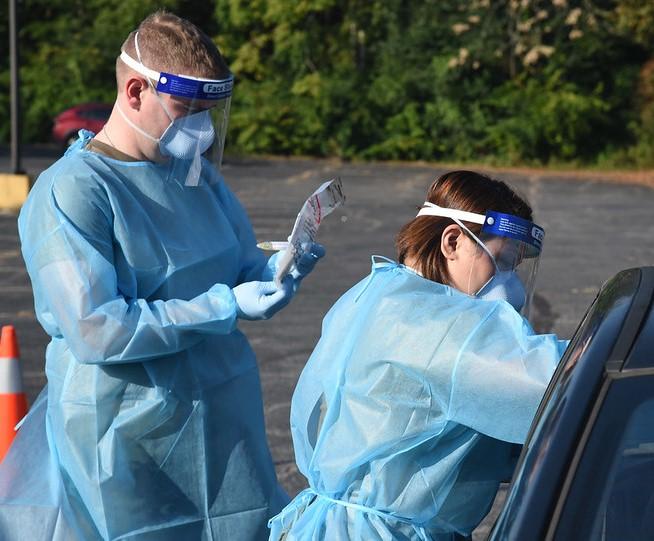COVID-19 cases in the United States are at an 8-week high, with early signs of a rise even in the Northeast, as questions continued to swirl about President Donald Trump's health and the extent of spread linked to the White House.
Cases rise in 28 states
The United States reported 56,191 cases yesterday, according to Johns Hopkins tracking, marking an 8-week high, CNBC said in its analysis, noting that new cases have been rising over the past 4 days. Only two states—Alabama and Hawaii—are reporting declines, with 28 showing upward trends and 20 holding steady, CNN reported.
Meanwhile, an analysis from the New York Times said cases are creeping upward in the Northeast, a former hot spot that won praise for driving down its cases to very low levels. In New York City, confusion and anger are growing in some neighborhoods targeted for school and business closures because of rising cases, with Orthodox Jewish groups and Brooklyn's Roman Catholic diocese filing lawsuits.
New Jersey health officials yesterday warned the state to brace for a second wave that could escalate quickly, as the state's daily total yesterday hit its highest level in 4 months.
Meanwhile, in its latest forecasts on COVID-19 deaths, the Centers for Disease Control and Prevention (CDC) said the nation's fatalities could reach 233,000 by the end of October. So far, the United States has reported 7,648,256 cases, along with 213,390 deaths, according to the Johns Hopkins online dashboard.
White House probe intensifies
In new developments with the White House cluster, the White House has tapped two CDC epidemiologists to help identify who may have been exposed to the virus, the Washington Post reported. A CDC spokesman said one epidemiologist has been at the White House since March, and a second arrived recently.
President Trump and First Lady Melania Trump's infections were first announced on Oct 2, hours after news that one of his closest aides had tested positive. Since then, 37 infections have been linked to White House staff and their associates, including several who attended a Sep 26 Rose Garden event for Supreme Court nominee Judge Amy Coney Barrett. The latest cases appear to include two more White House residence staff workers, the New York Times reported.
Health officials in Washington, DC, sent an open letter to community members asking anyone who worked in the White House in the past 2 weeks or attended the Sep 26 Rose Garden event to get tested for COVID-19 and self-quarantine. Senate Majority leader Mitch McConnell yesterday said he's avoided the White House since August because of its lax coronavirus protocols, Politico reported.
Tony Fauci, MD, director of the National Institute for Allergy and Infectious Diseases (NIAID) and member of the White House coronavirus task force, told CBS News today that the White House is the site of a superspreader event. "The data speak for themselves."
Details still murky on Trump's illness
After Trump received clearance from his doctor to hold campaign events in Florida and Pennsylvania over the weekend, media reports say the campaign has now scrapped the plans owing to logistical challenges. His latest plan is to address supporters tomorrow from the balcony of the White House, ABC News reported, citing White House sources familiar with the planning.
Trump had said he would likely to be tested today, but so far there is no word on whether he is still testing positive, and his spokespeople have not said when his last negative test result was, raising questions about where and when he was exposed to the virus, as well as about who else may have been exposed after he contracted COVID-19.
Meanwhile, the possibility of another COVID-19 stimulus package is still up in the air, after Trump scuttled negotiations on Oct 6, then a day later reversed course by pushing standalone funding for airlines and direct payments to Americans. Today, ahead of more talks between House Speaker Nancy Pelosi and Treasury Secretary Steven Mnuchin, Trump pushed for a $1.8 trillion package, up from the White House's previous offer but still below the $2.2 trillion that House Democrats have proposed, CNBC reported.























